How to fish the Long Meadow Pool on the Welsh Dee at Llangollen
Introduction
Would like to know how to fish the Long Meadow Pool on the Bathers beat of the Welsh Dee.
If Yes…
You’ll definately find this fly fishing guide very useful and informative.
This guide condenses years of experinece fly fishing this pool. On working through it, you will learn the different approaches I empoly for catching grayling and brown trout; and how best to adjust your approach for different river & weather conditions.
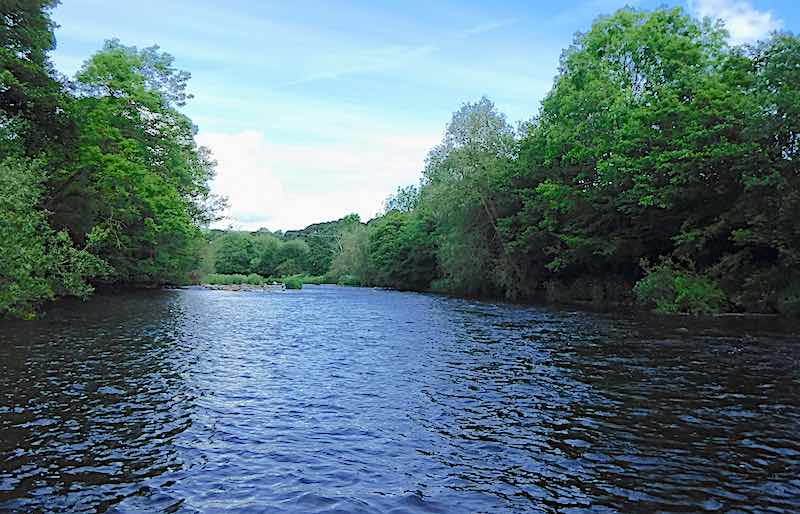
How to get to the Long Meadow Pool?
From Froncysyllte take the B5434 to Trevor. Before Cysylltau bridge turn right on the bend and go the lane, under the Pont Cysyllte Aqueduct, to the small carpark on left.
Walk down the lane, through the barrier into the yard by the brick building. Go over the style in the bottom right-hand corner of the yard. Follow the path along the river and over the gate into the next field.
Continue walking along the tree lined river and down to the first pool (Llyn-y-Boat Pool). At the end of this pool is the riffle that runs into the Long Meadow Pool. [The section at the end of this guide has Goggle map location finder.]
Fly fishing the Long Meadow Pool for trout and grayling:
The Long Meadow Pool is one of my favourite fishing places for trout and grayling on the Bathers Beat of the Welsh Dee. Especially, during the summer months when the river is below 0.6m (Manley Hall gauge) because fish hold in the fast-oxygenated water behind submerged boulders and other obstacles.
It’s not a pool I fish when the river level is above 0.7m because the fish are pushed into the body of the pool, which is heavily tree lined from the right bank. However, it is possible to fish the body and tail of the Long Meadow Pool from the left bank, accessed from Ty Mawr Country Park. Unfortunately, the fishing is disturbed by regular dog walkers.
To help you fish the Long Meadow Pool I have produced the following sketch, which highlights where I catch most of the fish.
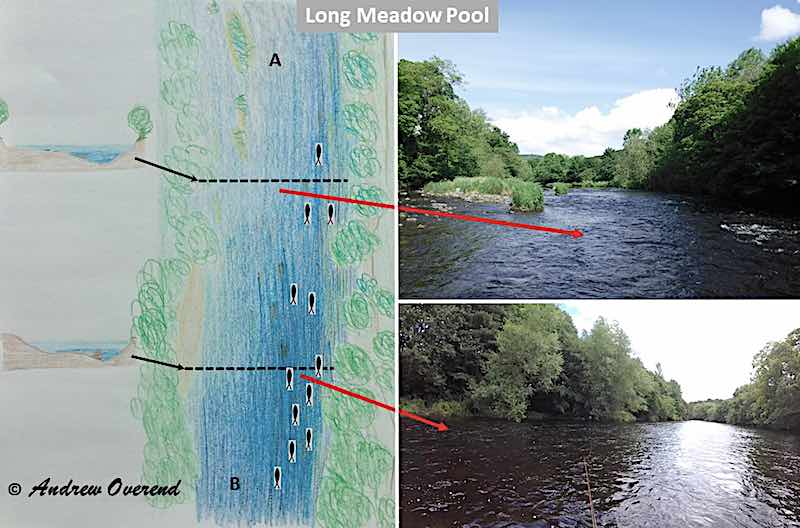
How to fish the Long Meadow Pool from October to February?
On the Welsh Dee, my attention turns to fly fishing for grayling from October to the end of February. There are many good pools for grayling fly fishing on the Llangollen-Maelor beats and the Long Meadow is one of them.
It is best fished when the river is below 0.6m (Manley Hall gauge) because grayling tend to be distributed throughout the top section of the pool, which can be fished from the right bank.
The approach I take is strongly influenced by signs of surface fly activity.
Czech nymphing the Long Meadow Pool:
On cold mornings, when there is no fly life activity, it is usually best to start by searching the river bed with a team of Czech nymphs. Since, grayling are likely to be grubbing on the riverbed for food. Czech nymph selection depends on a number of conditions that are covered in detail in the fly fishing technique page.
However, the following is a typical example of a team of Czech nymphs I will use when the river is running clear. The heavy nymph is used to drag the small nymphs to the river bed quickly.
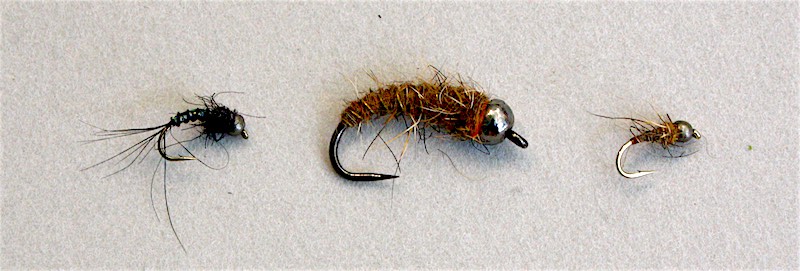
In coloured water, nymphs that work best tend to have a bright spot (e.g. gold head, orange-tag, etc) in sizes 14 and larger.
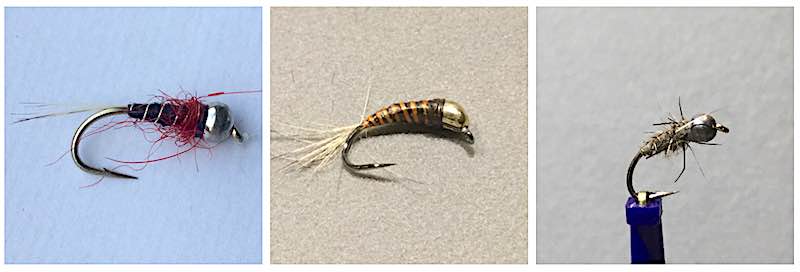
Usually, I start fishing in the riffle above the pool (point A) and fish my way across/down river in zigzag fashion. Particular focusing on areas of slower flow caused by riverbed features (i.e. weed beds, boulder, snags etc.).
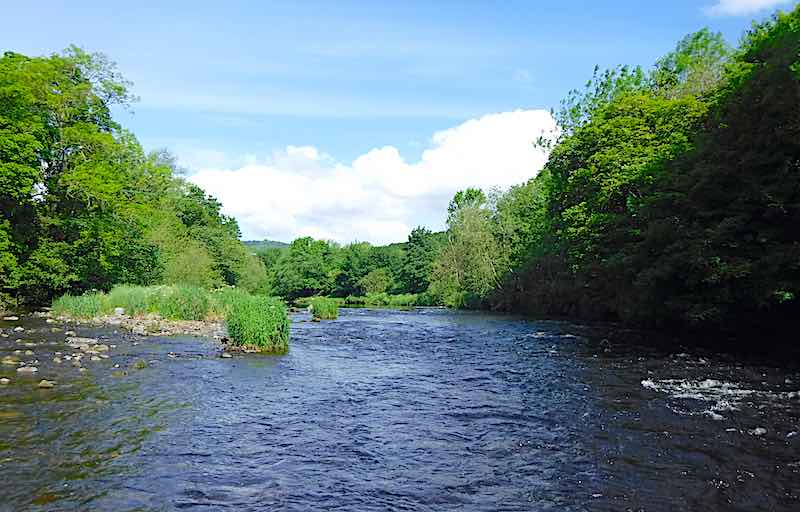
I stop fishing the pool at point B because it becomes too deep to wade beyhond that point. On the above sketch I’ve highlighted fish hot spots. However, because grayling move around don’t ignore other parts of the pool.
The following video show me fishing the riffle leading into the main part of the Long Meadow Pooll.
Wet fly fishing the Long Meadow Pool:
If fishing the pool with Czech nymphs doesn’t produce any results or my catch rate fades, then I switch to to fishing a team of wet flies or spiders. A reduction in catch rate usually occurs when the fish have started taking flies higher in the water column, which can happen around mid-day due to a surface temperature rise.
When it’s not possible to identify what flies the grayling are feeding, I will start with one of my workhorse team of wet flies /spiders spaced 3ft apart on 3lb copolymer leader, depending on the time of year.
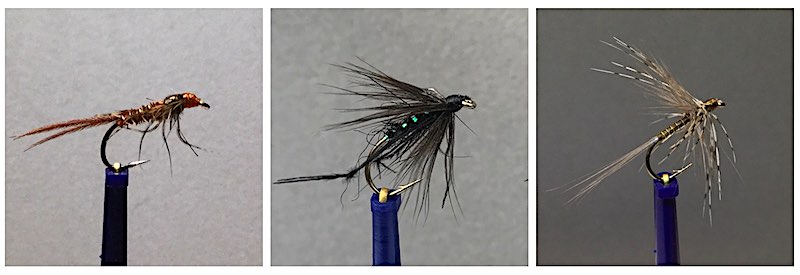
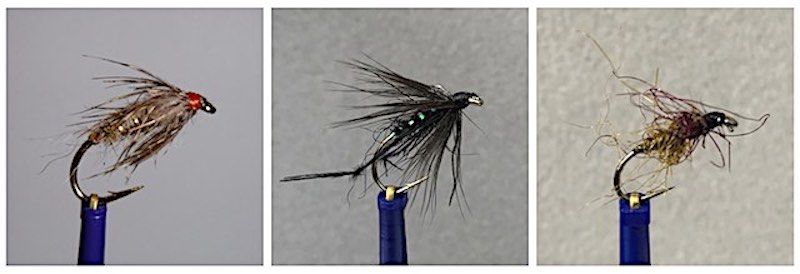
If after 15 – 20 minutes, I haven’t had any takes, I start trying other patterns until success comes.
That said, the workhorse teams rarely fail to catch grayling.
At rivers below 0.6m (Manley gauge) I start fishing the Long Meadow Pool with wet flies from the tail of the pool (point B) up to the head of the pool. Casting the flies upriver at a 45 degree angle and allowing them to dead-drift downriver. When the flies drift downstream of me, I mend the line to slow the swing to the dangle.
Even if fish are rising close to the far bank, it is often wise to resist the temptation to cast directly to them. A better approach is to divide the width of the river into 3ft lanes and search each lane before fishing the lane holding the rising fish.
This approach often yields grayling that you have not seen and that otherwise would have been spooked.
If there is a strong downstream wind, I find it best to start at the head of the pool (point A) and fish the wet flies across and downstream.
I have a separate page on Wet Fly fishing that has more information on the approach I find successful.
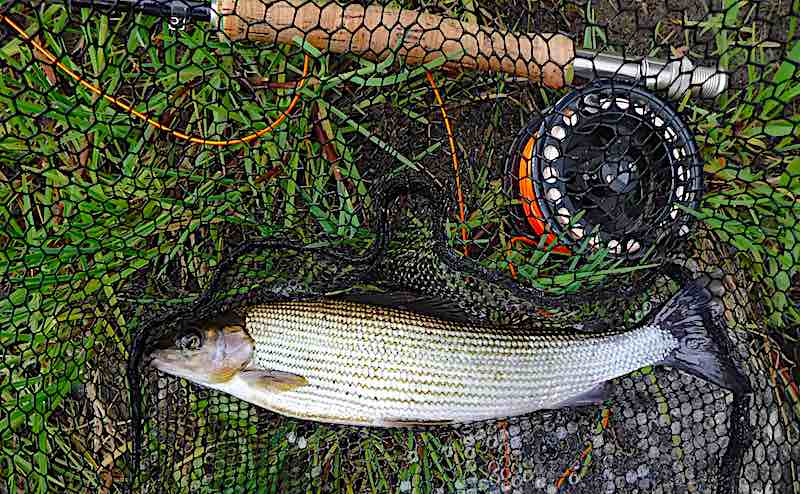
Dry fly fishing the Long Meadow Pool:
Grayling can be tempted to take a dry fly when there’s no sign of surface fly life. This is especially so when they are lying in less than 3ft of water.
When the Welsh Dee is close to its summer level, most of the Long Meadow pool is less than 4ft deep. Therefore, when fishing this part of the pool it’s best to cover likely lies with the dry-fly, before casting to rising grayling.
It’s best to base fly choice on imitating fly that are hatching. However, if this is no possible one of the following will usually catch grayling from October onwards:
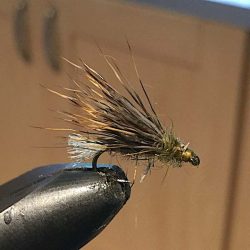
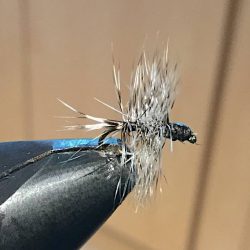
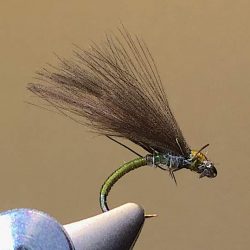
How to fish the Long Meadow Pool from March to September?
The brown trout fishing season on the Welsh Dee starts on the 3rd March. At this time of year in Llangollen, the weather is often more like winter than spring. Therefore, my approach to brown trout is similar to that described for autumn & winter grayling above.
10 March fly tips – How to catch beautiful brown trout on the Welsh Dee
Once April arrives, the weather usually starts to warm up and hatches of Large Dark Olive, March Brown and other olives become more frequent from mid-morning to mid-afternoon. This provides more opportunities to catch brown trout on the dry fly, by matching the hatch.
6 April flies for catching more trout on the beautiful Welsh Dee
As May approaches fly hatches become more prevalent and brown trout are keen to intercept emerging fly life. This is when dry-fly and upstream wet-fly fishing often yield the best results. Unless the river is carrying some colour when Czech nymphing generally produces better results.
The river flows in a southereast direction through the Long Meadow Pool and on sunny days it is too bright to fish this pool from 11 am to 4 pm. Therefore, it’s best fishing this pool early morning and late evening.
On dull, overcast days this pool can be fished throughout the day, but the fishing still slows between 1 and 4 pm. Making this a good time for a break before resuming the challenge in the evening.
8 Great flies for June on the beautiful Welsh Dee
I usually start fishing at the tail of the pool and fish my way upriver, searching all the likely lies with either wet or dry flies. Resist the temptation to cast directly to rising fish; instead, progressively fish the water leading up to where the fish is rising.
Often, fish are caught from the area between mid-river and the far bank. Especially, in the slacker water behind submerged boulders.
My top flies for July on the amazing Welsh Dee
After a bright sunny day, the pool can come alive as dusk approaches; especially, on warm evenings in the summer. When this happens, my approach is to start with the dry fly and concentrate of rising fish.
When the light starts to fade I switch to a team of wet flies (size 16 to 12) on 6lb leader, because their is a chance of a large fish (i.e. grayling and brown trout 2lb+, sea trout and the occasional grisle).
Directions and Parking to the Long Meadow Pool:
From the A5 in Froncysyllte take the B5434 to Trevor. As you approach the sharp left-hand bend near the bottom of the hill turn right onto a narrow lane, which takes you under the aqueduct. Drive under the aqueduct and you will reach a small parking area on your left, just before the end of the track.
To reach the Long Meadow Pool walk down the lane, through the barrier into the yard by the brick building. Go over the style in the bottom right-hand corner of the yard. Follow the path along the river and over the gate into the next field.
Continue walking along the tree lined river and down to the first pool (Llyn-y-Boat Pool). At the end of this pool is the riffle that runs into the Long Meadow Pool.
Before visiting please check that access to this beat has not changed on the Llangollen-Maelor Angling Club website.
Disclaimer:
Like most outdoor sports, fishing is not without its hazards. Therefore, YOU MUST DO YOUR OWN RISK ASSESSMENT before starting to fish the Long Meadow Pool. Especially if you decide to wade and/or fish at night. In addition, you must follow the Llangollen-Maelor Club Rules when accessing and fishing this water.